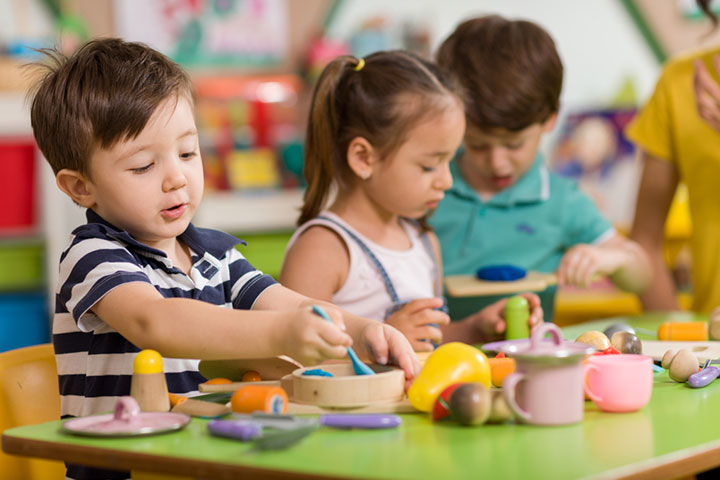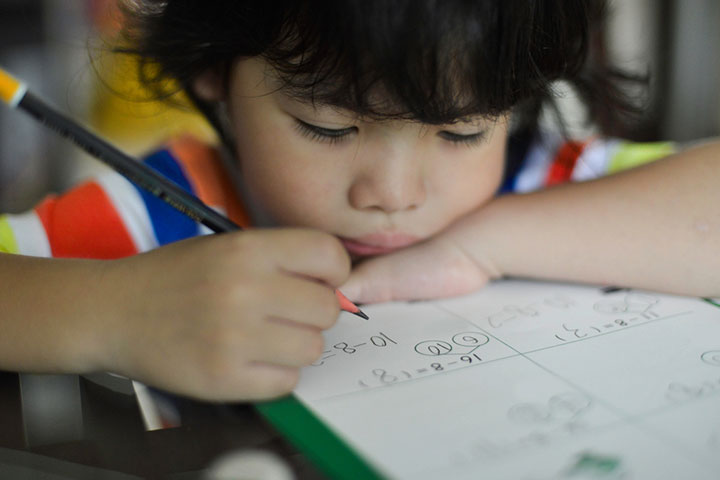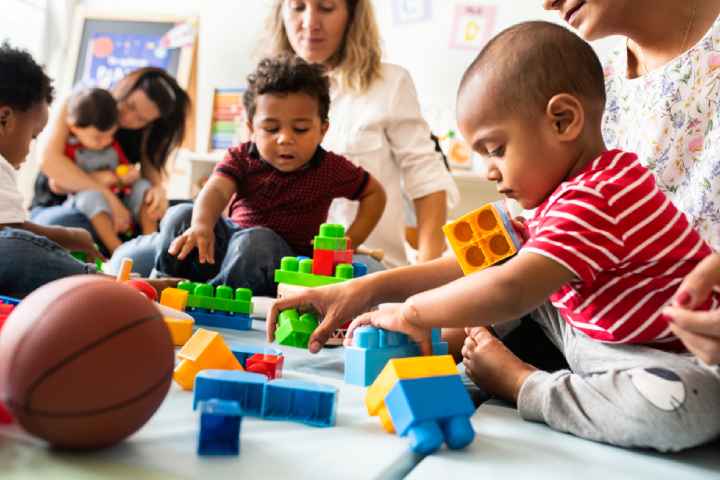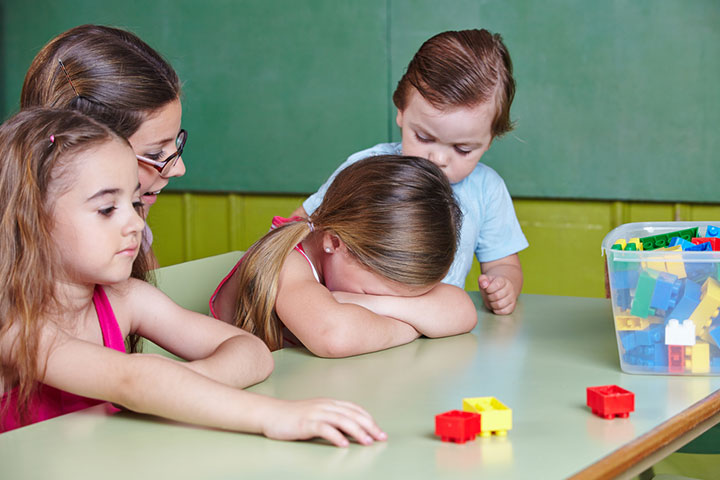Preschool, also known as kindergarten or pre-kindergarten in many countries, is where three- to five-year-old children take their initial steps toward formal education. However, despite the ubiquitous existence of preschools, parents may have reservations about the advantages of a preschool and how effective it is in preparing children for school and college.
Though preschool is considered the starting point for a child’s education, it’s natural to have such doubts as a parent, and you may question whether you can skip preschool altogether.
To assist you in making a decision, this article provides you with a summary of the benefits and drawbacks of sending your child to a preschool.
What Are The Advantages Of A Preschool?
Preschools provide children with the initial resources for social interactions. It could mean that a child can reap some benefits out of attending a preschool. We list some of them here.
1. Head start in social and emotional skills
At a preschool, the child is surrounded by several other kids, teachers, and staff. It is unlike home where a kid has the company of the parents and a few family members only. Exposure and interaction with other people involve multiple emotions and help them develop socialiXThe capacity to effectively engage in conversation and communicate to create and maintain social relationships. and emotional skills such as creativity, imagination, confidence, independence, teamwork, problem-solving, and critical thinking.
A significant number of these skills learned at the preschool can go a long way in helping the child in the future. A few social and emotional skills that a child is likely to learn at preschool are (1):
- Forming a rapport with peers and spending time with them in a group.
- Initiating conversations and working in teams during play.
- Listening to directions and obeying rules by teachers or other elders with a sense of discipline.
- Performing an instructed task.
- Regulating one’s emotions and displaying appropriate behavior while receiving feedback.
- Observing and understanding the emotions of peers and learning to respond correctly.
It is not uncommon for parents to discover that their child who was usually reserved and fussy at home has turned cooperative and interactive after attending preschool. The achievement of such milestones by the child is one of the main reasons most parents consider sending their child to preschool.
2. Nourishes cognitive and other health benefits
The social interaction and time-spent with peers at preschool are said to improve the overall cognitive functionsiXThe mental operations that enable us to think, learn, and comprehend our surroundings. of the child (2). Some studies even suggest that early preschool education could have a tangential positive impact on other aspects of the Some studies even suggest that early preschool education could have a tangential positive impact on other aspects of the child’s health and nutrition. According to the US Center for Disease Control and Prevention, children who attended preschool tend to push their body mass index (BMI) into the healthy range (3). Overweight children began to attain healthy weight while those that were underweight gained weight.
The study noted that one of the probable causes for this could be an improvement in the child’s ability to cope with stress. Preschool might help children deal with psychological stress as it teaches them to regulate behavior. Stress and behavioral problems even in young children are associated with an increased risk of obesity.
3. Benefit the child in higher education
A study has found that children who attended full-time kindergarten (six hours a day) displayed better language and mathematics skills, which would be helpful later (4). Early math skills like understanding size, shapes, and patterns, counting verbally, and recognizing numerals can be the foundation for advanced mathematical skills in higher education. There are different wonderful activities to make these mathematical concepts easily understandable to preschoolers that lay the foundation for higher education. These are taught through various mathematical tools, which are colorful and highly engaging for toddlers (5).
4. Nurtures the child’s curiosity
Preschools instill imagination and creativity among children, making them curious adults. Children gain the ability to see the world around them through different playful activities, which help them to become creative and curious individuals to explore the world around them (6).
5. Encourages physical development
Preschool not only fosters a child’s social and emotional development but also provides an opportunity for physical development (7). Preschools often provide ample space for children to engage in physical activities like running, jumping, climbing, and playing with balls that promote the development of gross motor skills and contribute to improved self-expression. It has also been seen that children with well-developed motor skills tend to exhibit greater confidence in their abilities.
6. Keeps in line with the peer trends
A child who skips preschool and joins the main school directly might miss social interactions and the routine and structure of preschool, thus finding it difficult to interact with their teacher and classmates. Also, a child with delayed preschool exposure by a year (called ‘redshirting’) will join a preschool class with most students being a year younger than them, and thus it could be difficult to adjust. However, if the child is outspoken and friendly by nature, then these scenarios may not be a problem.
Parents gave importance to early childhood education, which can be seen in the trend depicted in the below graph. There was an increase in the number of enrolled three and four-year-olds to 47.4% between 2005 and 2008. The number declined till 2013, and it can be speculated that the recession caused it. It can be inferred from the graph that the number of preschool enrollments has slightly increased since 2013.
Percentage of 3-4-year-olds enrolled in a preschool (2005-2019)
Source: Heightened Focus on Early Childhood Education Programs as Preschool Enrollment Increased Before COVID-19; US Census Bureau/ACS
The advantages of sending your child to a preschool are significant. But preschool education has its set of drawbacks.
What Are The Disadvantages Of Preschool?
Certain aspects of preschool education may not work well for a child. Below is a list of the likely disadvantages of preschool education:
1. Does not accommodate children with developmental delays
Children with developmental delays may have a hard time adjusting to the environment of a preschool. The nature of school activities may be staggering for a child who is slow at cognitiveiXThe development of the child’s brain and mental abilities. and physical growth. Not all preschools have provision to adapt to slow learners among the group, and the child may feel alienated.
The problem can be more acute with children with special needs, for instance, those with autism. Children with autism can be slow in social interaction and can get overstimulated quickly (8). Therefore, a conventional preschool may not be an ideal place for them. The key to addressing the accessibility problem for children with special needs would be finding an appropriate and helpful program.
2. Focus on academics
Some full-day preschool programs may become excessively academic to the point that the preschool becomes like the first grade. That is not appropriate for children since they are still learning basic skills and may not be mentally ready to plunge into academics. Children who are slow learners, but do not have developmental delayiXWhen a child’s growth and development (such as talking and walking) lag behind normal, impacting one or more developmental areas., will still find the pressure daunting. Of course, the nature of education varies from one preschool to another. Nevertheless, imparting academic skills, even if basic, may not be a good idea (9).
Rachel Norman, a mother of five and author, took all things into consideration and decided not to send her children to preschool. Instead, she lists out several things she would do with her kids during the day, one of which is doing school for fun. She says, “My kids love ABCmouse. The kids get to create their own learning path and do lessons that are interactive, fun, and suited to the child’s level. My kids think it’s so fun they’ll watch each other play. The standards are up to the public school level and it’s a great way to add in a bit of learning without the drama. My daughter is quite bright. Because of that I know it’s good to challenge her, but I also know that she challenges herself. We bought this Amelia Bedelia set for her first chapter books, and we’re already looking forward to the next books. Kindergarten will start and with it homework and then lessons and units. For now, we’re going to read for fun (i).”
Choosing to send your child to a preschool is a personal choice. However, a right preschool can positively change a child’s life as it can provide them with opportunities for exploration and fun-based learning. As parents, it is essential to choose a good preschool that does not have shortcomings, prioritizes child safety, and provides opportunities for inclusive growth.
If the advantages of a preschool influenced you to enroll your child in one, ensure to place them into a school that suits their needs. Consider their and your requirements before making a final decision. Also, note that your child may be reluctant to attend initially. The sudden switch from a house to a crowded environment may confuse them. Hence, let the progress to a preschool depend on your child’s comfort levels and readiness. You may speak to the preschool authorities and seek permission to take them home if needed. Over time, as they socialize well with their friends and preschool teachers, you may retract the extent of your intervention.
Key Pointers
- Preschool offers early development of social and emotional skills such as relationship-building, teamwork, and emotion regulation.
- Preschool can lead to improved cognitive function, healthy weight, and better preparation for higher education.
- Skipping preschool may result in difficulty adjusting to social interactions in school.
- Preschool may not be suitable for children with developmental delays and could become overwhelming if it becomes too academic.















